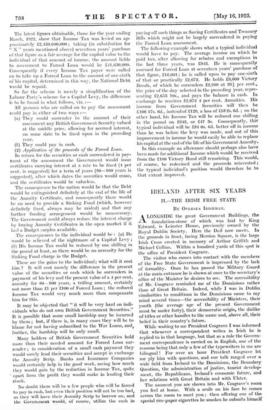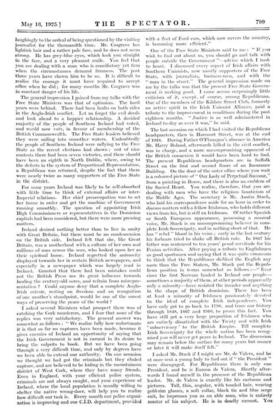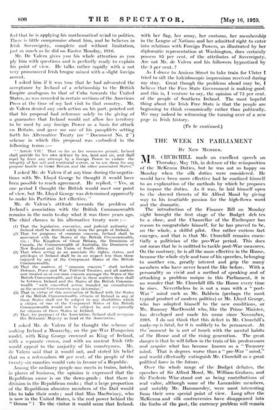IRELAND AFTER SIX YEARS
II.—THE IRISH FREE STATE
BY OVERSEA IRISHMAN.
_ALONGSIDE the great Government Buildings, the foundation-stone of which was laid by King Edward, is Leinster House, previously owned by the Royal Dublin Society. Here the Dail now meets. In the grounds in front, facing Merrion Square, is the large Irish Cross erected in memory of Arthur Griffith and Michael Collins. Within a hundred yards of this spot is the office of President Cosgrave.
The visitor who comes into contact with the members of the Free State Government is impressed by the lack of formality. Once he has passed the Military Guard at the main entrance he is shown at once to the secretary's office of the Minister he desires to see. The accessibility of Mr. Cosgrave reminded me of the Dominions rather than of Great Britain. Indeed, while I was in Dublin similarities to conditions in the Dominions came to my mind several times—the accessibility of Ministers, their youth (the average age of the present Government must be under forty), their democratic origin, the dislike of titles or other handles to the name and, above all, their belief in their country's future.
While waiting to see President Cosgrave I was informed that whenever a correspondent writes in Irish he is replied to in that language, but that as a rule the Govern- ment correspondence is carried on in English, one of the reasons being that only a few of the typewriters in use are bilingual ! For over an hour President Cosgrave let me ply him with questions, and our talk ranged over a wide field from Ireland to the Dominions, the Boundary Question, the administration of justice, tourist develop- ment, the Republicans, Ireland's economic future, and her relations with Great Britain and with Ulster.
The moment you are shown into Mr. Cosgrave's room you feel at home. With a smile on his face he comes across the room to meet you ; then offering one of the special rice-paper cigarettes he smokes he submits himself laughingly to the ordeal of being questioned by the visiting journalist for the thousandth time. Mr. Cosgrave has lightish hair and a rather pale face, and he does not seem strong. He has grey-blue eyes, which look you straight in the face, and a very pleasant smile. You feel that you are dealing with a man who is conciliatory yet firm when the circumstances demand firmness. The past three years have shown him to be so. It is difficult to realise the courage it must have required to accept office when he did ; for many months Mr. Cosgrave was in constant danger of his life.
The general impression I gained from my talks with the Free State Ministers was that of optimism. The hard years were behind. There had been faults on both sides in the Anglo-Irish conflict. Let us forget the evil deeds and look ahead to a happier relationship. A decided majority of the people of Southern Ireland had voted, and would now vote, in favour of membership of the British Commonwealth. The Free State leaders believed they were sailing into smoother waters. Undoubtedly the people of Southern Ireland were rallying to the Free State as the recent elections had shown ; out of nine contests there had been seven victories, and there should have been an eighth in North Dublin, where, owing to the defects in the system of Proportional Representation, a Republican was returned, despite the fact that there were nearly twice as many supporters of the Free State in the district.
For some years Ireland was likely to be self-absorbed with little time to think of external affairs or inter- Imperial relations. Her chief preoccupation was to set her house in order and get the machine of Government running smoothly. The question of appointing Irish High Commissioners or representatives in the Dominion capitals had been considered, but there were more pressing matters.
Ireland desired nothing better than to live in amity with Great Britain, but there must be no condescension on the British side. Ireland felt that she, like Great Britain, was a motherland with a culture of her own and millions of sons across the seas, who looked upon her as their spiritual home. Ireland regretted the animosity displayed towards her in certain British newspapers, and especially in a newspaper which was largely read in Ireland. Granted that there had been mistakes could not the British Press use its great influence towards healing the century-old sores, and refrain from misrepre- sentation ? Could anyone deny that a complete Anglo- -Irish entente, resting on freedom and on recognition of one another's standpoint, would be one of the surest ways of preserving the peace of the world ?
I asked several Ministers what prospect there was of catching the Cork murderers, and I fear that none of the replies was very satisfactory. The general answer was somewhat as follows : " We realize fully how unfortunate • it" is that so far no captures have been made, because it gives enemies of Ireland an opportunity of saying that the Irish Government is not in earnest in its desire to bring the culprits to book. But we have been going through a very difficult time, and only by degrees have we been able to extend our authority. On one occasion we thought we had got the criminals but they eluded capture, and are believed to be hiding in the mountainous district of West Cork, where they have many friends. Even in England, with your efficient police system, criminals are not always caught, and your experience of Ireland, where the local population is usually willing to shelter the native wrong-doer, will help you to realize how difficult our task is. Every month our police organi- motion is improving and our CI.D. department, provided with a fleet of Ford ears, which now covers the country, is becoming more efficient."
One of the Free State Ministers said to me : " If you wish to find out about us, you should go and talk with people outside the Government "—advice which I took to heart. I discussed every aspect of Irish affairs with Southern Unionists, now mostly supporters of the Free State, with journalists, business-men, and with the " man in the street." The general impression made on me by the talks was that the present Free State Govern- ment is making good. I came across surprisingly little criticism of it, except, of course, among Republicans. One of the members of the Kildare Street Club, formerly an active spirit in the Irish Unionist Alliance, paid a tribute to the improvement in conditions during the past eighteen months. " Justice is as well administered in Ireland to-day as ever it was," he said.
The last occasion on which I had visited the Republican headquarters, then in Harcourt Street, was at the end of 1918. During Father O'Flanagan's absence in America Mr. Harry Boland, afterwards killed in the civil conflict, was in charge, and a more uncompromising opponent of the British connexion it would have been hard to find. The present Republican headquarters arc in Suffolk Street on the first and second floors of an Insurance Building. On the door of the outer office where you wait is a coloured picture of " Our Lady of Perpetual Succour," from a painting in Rome, and there is also an emblem of the Sacred Heart. You realize, therefore, that you arc dealing with men who have the religious fanaticism of the Middle Ages. The secretary is Mr. Austin Stack, who laid his correspondence aside for an hour in order to discuss matters with a fellow Irishman, who holds different views from his, but is still an Irishman. Of rather Spanish or South European appearance, possessing a musical voice, Mr. Stack is an uncompromising believer in com- plete Irish Sovereignty, and in nothing short of that. He has " rebel " blood in his veins ; early in the last century his forbears tried to shake off British rule. In 1867 his father was sentenced to ten years' penal servitude for his Fenian activities. After paying a tribute to Englishmen as good sportsmen and saying that it was quite erroneous to think that the Republicans disliked the English any more than the Free Staters, Mr. Stack put the Repub- lican position in terms somewhat as follows :—" Ever since the first Norman landed in Ireland our people— sometimes a majority of them, at other periods apparently only a minority—have resisted the invader and anything in the shape of British dominion. There has been at least a minority of Irishmen passionately devoted to the ideal of complete Irish independence. You have only got to go back to 1798, and trace our history through 1848, 1867 and 1916, to prove this fact. You have still got a very large proportion of Irishmen who are entirely dissatisfied with the Treaty and with Irish ' subserviency ' to the British Empire. Till complete Irish Sovereignty for the whole nation has been recog- nised you will never get peace in Ireland. The dissension may remain below the surface for many years but sooner or later it will make itself felt."
I asked Mr. Stack if I might see Mr. de Valera, and he at once sent a young lady to find out if " the President " were disengaged. For Republicans there is only one President, and he is Eamon de Valera. Shortly after- wards I found myself in the presence of the Republican leader. Mr. de Valera is exactly like his cartoons and pictures. Tall, thin, angular, with tousled hair, wearing gold-rim glasses, a soft collar, black tie and blue serge suit, he impresses you as an able man, who is entirely master of his subject. He is in deadly earnest. You feel that he is applying his mathematical mind to politics. There is little compromise about him, and he believes in Irish Sovereignty, complete and without limitation, just as much as he did on Easter Monday, 1916.
Mr. De Valera gives you his whole attention as you ply him with questions and is perfectly ready to explain his point of view. He talks rather rapidly with a not very pronounced Irish brogue mixed with a slight foreign accent.
I asked him if it was true that he had advocated the acceptance by Ireland of a relationship to the British Empire analogous to that of Cuba towards the United States, as was recorded in certain sections of the American Press at the time of my last visit to that country. Mr. de Valera denied any such action on his part, pointed out that his proposal had reference solely to the giving of a guarantee that Ireland would not allow her territory to be used by any foreign Power as a basis for attack on Britain, and gave me one of his pamphlets setting lbrth his Alternative Treaty (or " Document No. 2 ") scheme in which this proposal was embodied in the following terms :- 'Article VII.' That so far as her resources permit, Ireland shall provide for her own defence by sea, land and air, and shall repel by force any attempt by a foreign Power to violate the integrity of her soil and territorial waters, or to use them for any purpose hostile to Great Britain and the other associated States."
I asked Mr. de Valera if at any time during the negotia- tions with Mr. Lloyd George he thought it would have been possible to reach agreement. He replied, " Yes, at one period I thought the British would meet our point of view, but Mr. Lloyd George was determined apparently to make his Partition Act effective. "
Mr. de Valera's attitude towards the problem of Ireland's association with the British Commonwealth remains in the main to-day what it was three years ago. The chief clauses in his alternative treaty were :- (1) That the legislative, executive, and judicial authority of Ireland shall be derived solely from the people of Ireland.
(2) That for purposes of common concern, Ireland shall be associated with the States of the British Commonwealth, viz. : The Kingdom of Great Britain, the Dominion of Canada, the Commonwealth of Australia, the Dominion of New Zealand and the Union of South Africa.
That when acting as an associate the rights, status, and privileges of Ireland shall be. in no respect less than those enjoyed by any of the Component States of the British Commonwealth.
(4) That the matters of " common concern " shall include Defence, Petice and War, Political Treaties, and all matters now treated as of common concern amongst the States of the British Commonwealth, and that in these matters there shall be between Ireland and the States of the British Common- wealth " such concerted action founded on consultation as the several Governments may determine."
(5) That in virtue of this association of Ireland with the States of the British Commonwealth, citizens of Ireland in any of these States shall not be subject to any disabilities which a citizen. of one of the C,omponent States of the British Commonwealth would not he subject to, and reciprocally for citizens of these States in Ireland.
(6) That, for purposes of the Association, Ireland shall recognize His Britannic Majesty as head of the Association.
I asked Mr. de Valera if he thought the scheMe of making Ireland a Monarchy, on the pre-War Hungarian model, with King George crowned as King of Ireland, with a separate crown, and with an ancient Irish title would appeal to the majority of his countrymen. Mr. de Valera said that it would not, and stated his belief that on a referendum 80 per cent. of the people of the twenty-six counties would vote in favour of a Republic: Among the ordinary people one meets in trains, hotels, in places of business, the opinion is expressed that the Republican cause is on the doWn-grade ; that there is division in the Republican rankS ; that a large proportion of the Republican abSentee members of the Dail would like to take their. seats ; and that Miss MacSwiney, who is now in the United States, is the real power behind the " throne " I To the visitor it would seem' that Ireland,
(3)
with her flag, her army, her customs, her naembershiP, in the League of Nations and her admitted right to enter into relations with Foreign Powers, as illustrated by her diplomatic representation at Washington, does certainly possess 95 per cent. of the attributes of Sovereignty. Are not Mr. de Valera and his followers hypnotized by the 5 per cent. ?
As I drove to Amiens Street to take train for Ulster I tried:to sift the kaleidoscopic impressions received during my stay. Great though the problems ahead may be, I believe that the Free State Government is making goOd, and this is, I venture to say, the opinion of 75 per cent. of the people of Southern Ireland. The most hopeful thing about the Irish Free State is that the people are beginning to think economically rather than politically. We may indeed be witnessing the turning over of a new page in Irish history.
(To be continued.)












































 Previous page
Previous page